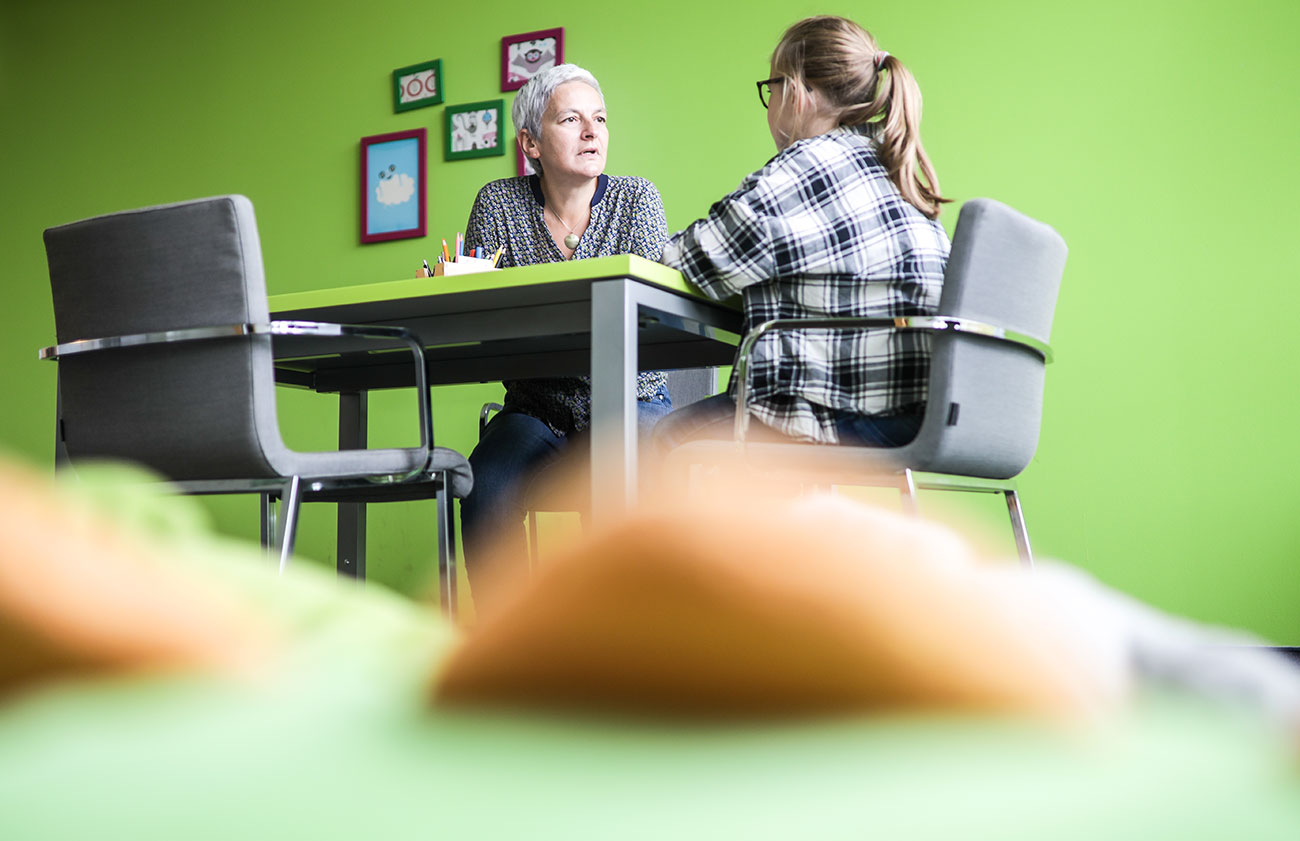
Familial transmission
Clinical psychology research is particularly strong in explaining the maintenance of mental disorders. Our knowledge of the causes and origins of mental disorders is not as profound. Family is a central context for the development of mental health and illness. In this research group, we address the question of how mental health and mental disorders are transmitted within a family. We consider psychological mechanisms such as social referencing or imitation learning as important candidates here. In our studies, we are interested in whether and how individual psychopathological features (not entire disorders) are passed on or learned, e.g., in parent-child interaction.
Head of the research group
Principal Investigator and Team
Prof. Dr. Silvia Schneider
Dr. Kerstin Konietzny
M.Sc. Karim Zagha
M.Sc. Lisa Heller
M.Sc. Nesreen Dababneh
Dr. med. Malek Said
Collaborator
Prof. Dr. Jochen Gensichen
Prof. Dr. Maike Luhmann
Prof. Dr. Jürgen Margraf
Prof. Dr. Hans-Christian Vollmar
Prof. Dr. Hans-Helmut König
PD Dr. Christian Brettschneider
Prof. Dr. Robert Kumsta
Funding
BMBF (FKZ 01EF1801A)
Duration
02-2019 – 07-2025
Description
The project “Improve Mental Health: Promotion for Refugee Parents and Their Children – a Randomized Controlled Treatment Study in Primary Care” aims to help refugee families. By the end of 2018, more than 1.8 million refugees have come to Germany, many of them children. Refugees often suffer from widespread mental health problems, especially depression, anxiety, and trauma-associated disorders. The planned project aims to improve Arabic-speaking refugee parents' mental health and prevent the development of mental health problems in their children (0-6-year-olds). This can be done by strengthening their parenting skills and helping them tackle their mental health problems. For 10 weeks, the parents receive an intervention (Improve treatment), which consists of 1) a short intervention to deal with symptoms of anxiety, stress, and depression (by general practitioners), 2) an established online training to encourage a positive parenting style (Triple P Online), and 3) accompanying telephone calls (by psychologists). The Improve treatment will be compared with the previous standard treatment of depression, anxiety, and stress in primary care (general medicine). The cultural sensitivity of the measurements, barriers and requirements of the interventions, and cost-effectiveness will also be evaluated.
Principal Investigator and Team
Prof. Dr. Silvia Schneider
Prof. Dr. Sabine Seehagen
Rabea Derhardt M. Sc.
Melanie Bunz M. Sc.
Collaborator
Free University of Berlin, Prof. Dr. Babette Renneberg (coordination of ProChild & sub-project 1)
University of Bremen, Prof. Dr. Nina Heinrichs (sub-project 3)
Ruhr-University Bochum, Prof. Dr. Robert Kumsta (sub-project 4)
Free University of Berlin, Prof. Dr. Ulrike Urban-Stahl (sub-project 5)
Funding
Federal Ministry of Education and Research (Funding number 01KR1805B)
Duration
Since 2019 - February 2025
Description
Being exposed to violence and maltreatment as a child is a severe and well-documented risk factor for abnormal development. Children of mothers with borderline personality disorder (BPD) are at a particularly high risk of experiencing violence and maltreatment. There is compelling evidence that exposure to environmental adversity during childhood is associated with negative outcomes in adulthood. While the adverse impact of maternal BPD and the associated violent parenting practices on their children are known, the disorder-specific impact of maternal BPD on their children and the potential beneficial effects of a disorder-specific parent training on the children have not yet been investigated in detail.
Therefore, the overall goal of the ProChild study is to improve prevention of maltreatment and to promote mental health in children of mothers with borderline personality disorder (BPD) by strengthening mothers’ parenting skills.
The first aim of the present sub-project 2 is to examine the emotion regulation strategies and mental health status of children of mothers with BPD compared to a) children of mothers with anxiety disorders or depression and b) to children of mothers with no mental disorder. Secondly, the impact of a disorder-specific parenting program on the children’s emotion regulation and mental health is studied. Additionally, potential mediators and moderators will be considered. Children’s mental health status will be assessed with a structured Interview (Baby-DIPS and sub-sections of the Kinder-DIPS). Children’s temperament will be assessed via maternal report using questionnaires. Emotion regulation of the children will be explored using age-appropriate waiting tasks. All parameters are measured before and after the parenting training. A total of 324 children between 6 months to 6 years will be recruited, of which 178 account for children of mothers with BPD, 66 for children of mothers with depressive or anxiety disorders, and 80 for children of healthy mothers. Patients will be recruited by contacting individual therapists who specialize in BPD treatment. We assume that 10% will not meet the inclusion criteria. Furthermore, we expect a dropout rate of 25%. Consequently, final analysis will be conducted with 150 children of mothers with BPD and 70 control children.
